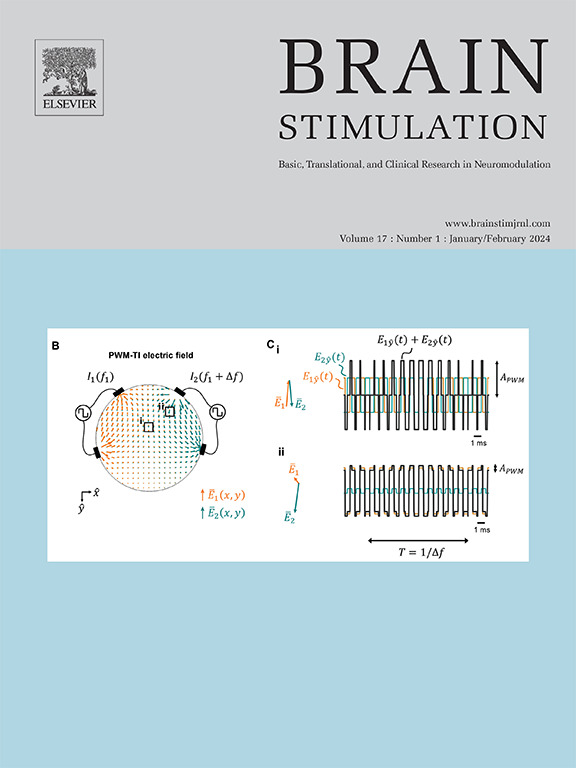Affective state-dependent effects of prefrontal rTMS on the cognitive control of negative stimuli in healthy and depressed individuals
IF 7.6
1区 医学
Q1 CLINICAL NEUROLOGY
引用次数: 0
Abstract
Introduction
High-frequency repetitive transcranial magnetic stimulation (HF-rTMS) targeting the left dorsolateral prefrontal cortex (lDLPFC) is an established, clinically effective treatment for major depressive disorder (MDD). However, evidence of the cognitive effects of lDLPFC HF-rTMS, especially those cognitive functions affected by MDD, is mixed.
Methods
We here assessed the cognitive effects of a single, offline, 10Hz rTMS session on task performance in an emotional faces N-back (EFNBACK) task, in both healthy and depressed individuals. We measured response times, accuracy, and sensitivity, in a sham-controlled, pre-post design. Importantly, using the Beck Depression Inventory (BDI-II), we assessed whether the cognitive effects of the stimulation are state-dependent on trait-state depression.
Results
We found lDLPFC HF-rTMS enhanced cognitive control over angry distractors. More importantly, these cognitive control effects were state-dependent on trait-state depression. HF-rTMS produced distinct performance changes dependent on baseline BDI-II scores. As a function of BDI-II scores, we observed either increased or decreased response times on the task. Further, we observed improved accuracy and sensitivity only on angry distractor trials as BDI-II scores increased, as a consequence of lDLPFC stimulation.
Conclusion
These results underscore the role of HF-rTMS in enhancing executive control over negative emotional information by modulating lDLPFC, with effects varying according to depression state at the moment of the treatment session. HF-rTMS thus not only enhances inhibitory control over emotional stimuli but also exhibits such cognitive effects contingent on depressive state, contributing to our understanding of the state-dependence of therapeutic rTMS.
前额叶rTMS对健康和抑郁个体负刺激认知控制的情感状态依赖效应
针对左背外侧前额叶皮层(lDLPFC)的高频重复经颅磁刺激(HF-rTMS)是一种成熟的、临床有效的治疗重度抑郁症(MDD)的方法。然而,lDLPFC HF-rTMS的认知影响,特别是那些受重度抑郁症影响的认知功能的证据,是混合的。方法本研究评估了单次离线10Hz rTMS对健康和抑郁个体在情绪面孔N-back (EFNBACK)任务中任务表现的认知影响。我们在假控制的前后设计中测量了反应时间、准确性和灵敏度。重要的是,使用贝克抑郁量表(BDI-II),我们评估了刺激的认知效果是否依赖于特质状态抑郁。结果lDLPFC - HF-rTMS增强了对愤怒干扰物的认知控制。更重要的是,这些认知控制效应依赖于特质状态抑郁。HF-rTMS根据基线BDI-II评分产生明显的表现变化。作为BDI-II分数的函数,我们观察到任务的反应时间增加或减少。此外,我们观察到,只有在愤怒分心试验中,由于lDLPFC刺激,BDI-II评分增加,准确性和灵敏度才会提高。结论HF-rTMS通过调节ldl - lpfc增强负性情绪信息的执行控制,其作用随治疗时抑郁状态的不同而不同。因此,高频rTMS不仅增强了对情绪刺激的抑制控制,而且在抑郁状态下也表现出这种认知效应,有助于我们理解治疗性rTMS的状态依赖性。
本文章由计算机程序翻译,如有差异,请以英文原文为准。
求助全文
约1分钟内获得全文
求助全文
来源期刊

Brain Stimulation
医学-临床神经学
CiteScore
13.10
自引率
9.10%
发文量
256
审稿时长
72 days
期刊介绍:
Brain Stimulation publishes on the entire field of brain stimulation, including noninvasive and invasive techniques and technologies that alter brain function through the use of electrical, magnetic, radiowave, or focally targeted pharmacologic stimulation.
Brain Stimulation aims to be the premier journal for publication of original research in the field of neuromodulation. The journal includes: a) Original articles; b) Short Communications; c) Invited and original reviews; d) Technology and methodological perspectives (reviews of new devices, description of new methods, etc.); and e) Letters to the Editor. Special issues of the journal will be considered based on scientific merit.
 求助内容:
求助内容: 应助结果提醒方式:
应助结果提醒方式:


